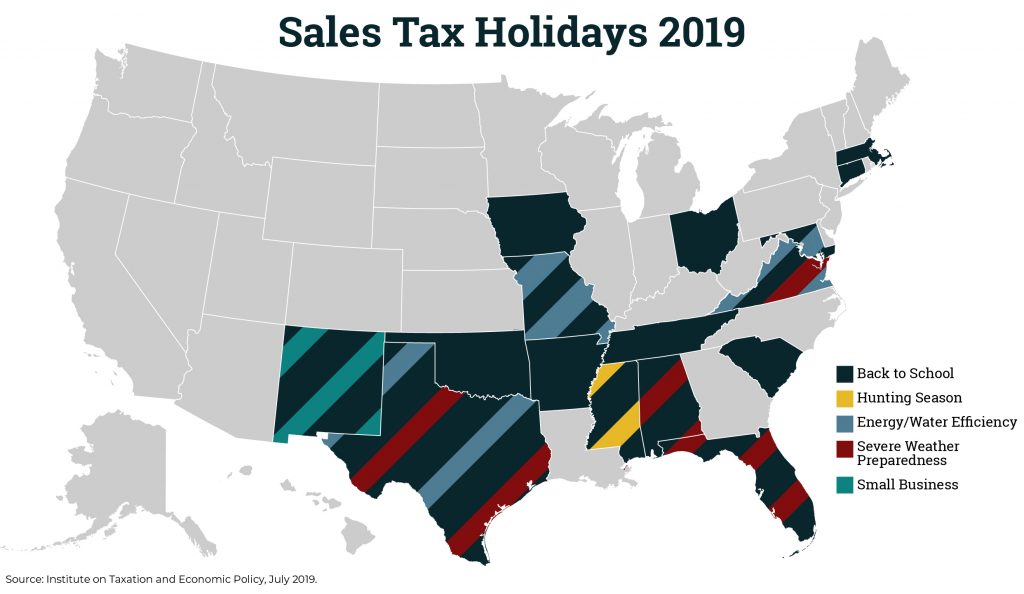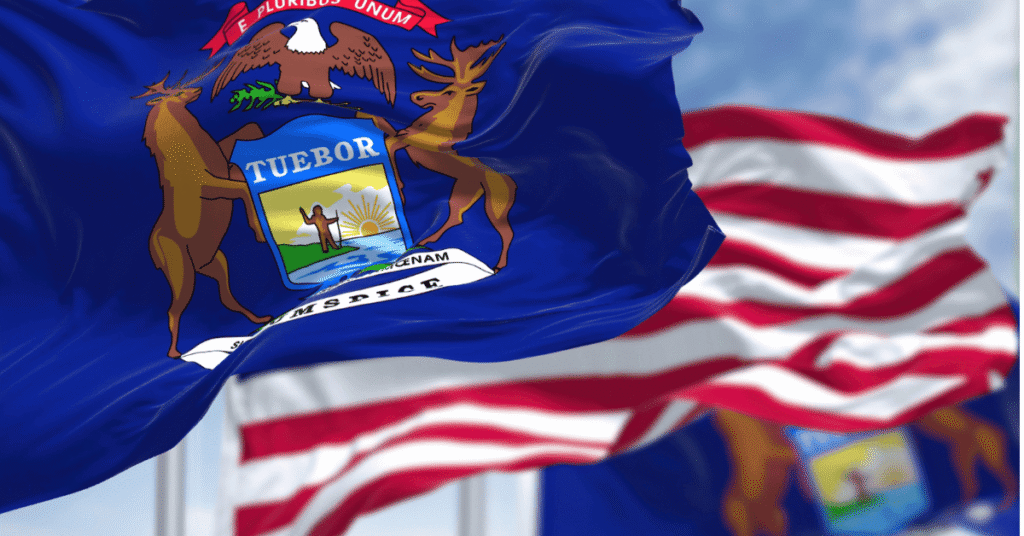Sales taxes are an important revenue source, composing close to half of all state tax revenues.[1] But sales taxes are also inherently regressive because the lower a family’s income, the more the family must spend on goods and services subject to the tax. Lawmakers in many states have enacted “sales tax holidays” (16 states will hold them in 2019), to provide a temporary break on paying the tax on purchases of clothing, school supplies, and other items. While these holidays may seem to lessen the regressive impacts of the sales tax, their benefits are minimal. This policy brief looks at sales tax holidays as a tax reduction device.
How Sales Tax Holidays Work
Sales tax holidays are temporary sales tax exemptions, usually applying to a small number of taxable items for a very limited period. These holidays are typically timed to take place in August during the traditional “back to school” shopping season, and offer breaks on school-related items such as clothing, school supplies, and computers. However, a few states exempt all taxable goods during the holiday. Separate holidays for energy-efficient appliances, guns and hunting season equipment, and storm preparation materials are becoming increasingly common as well, and one state (New Mexico) added a single-day “Small Business Saturday” holiday in 2018. Most sales tax holidays last only two or three days, and almost all holidays apply only to items below some specified price (e.g. clothing items priced over $100 are generally not exempted).
History of Sales Tax Holidays
The notion of a holiday was first introduced in 1980 when Ohio and Michigan opted to not tax the sale of automobiles for a period of time.[2] New York experimented with the current concept of sales tax holidays in 1996, but has since abandoned the policy. More than twenty states have enacted legislation at some point to provide holidays and proposals to extend the concept to more states and more types of purchases continue to appear each year.
Many states either repealed or temporarily suspended sales tax holidays when facing significant revenue gaps. For example, lawmakers in Florida, Georgia, Maryland, Massachusetts and the District of Columbia all canceled holidays during the height of the Great Recession; and although most of these reinstituted them afterward, Georgia and the District of Columbia’s holidays have not been revived and Florida’s has only returned in a scaled-back form. Louisiana, which once held three separate holidays for back-to-school shopping, hunting season, and hurricane preparedness, started paring them back due to budget woes in 2016 and has now cancelled all three.[3] Holidays in Illinois, New York, North Carolina, Vermont, West Virginia, and Wisconsin were also either short-lived or repealed.
States were generally wary of creating or expanding sales tax holidays in 2019. Mississippi added school supplies to its holiday and Florida added computers and two additional days, but efforts to create them in other states and bring them back in Louisiana were defeated.
Problems with Sales Tax Holidays
Policymakers tout sales tax holidays as a way for families to save money. On the surface, this sounds good. However, a two- to three- day sales tax holiday for selected items does nothing to reduce taxes for low- and moderate-income taxpayers during the other 362 days of the year. Sales taxes are inherently regressive. In the long run, sales tax holidays leave a regressive tax system unchanged, and the benefits of these holidays for working families are minimal. Sales tax holidays also fall short because they are poorly targeted, cost revenue, can easily be exploited, and create administrative difficulties.
Sales Tax Holidays Are Poorly Targeted
- Because wealthier taxpayers also benefit from sales tax holidays, they offer less “bang for the buck” from a fairness perspective than more targeted tax breaks such as low-income sales tax credits (described in ITEP Policy Brief, “Options for Progressive Sales Tax Relief”) or Earned Income Tax Credits (described in ITEP Policy Brief, “Rewarding Work Through Earned Income Tax Credits”).
- Wealthier taxpayers are often best positioned to benefit from the holidays since they have more flexibility to shift the timing of their purchases to take advantage of the tax break–an option that isn’t available to families living paycheck to paycheck. Many low-income taxpayers spend most or all of their income just getting by, which means that they also have less disposable income than wealthier taxpayers to spend when the holiday arrives. One recent study found that households that earn more than $30,000 were likely to shift the timing of their clothing purchases to coincide with a sales tax holiday, but households earning less than $30,000 were not.[4]
- The benefits of sales tax holidays are not limited to state residents, but instead extend to anybody who happens to be within the state’s borders at the time of the holidays, including tourists and individuals who live close to the border.
- Though the holidays are often marketed as boons to local businesses, all of these holidays except New Mexico’s “Small Business Saturday” apply to online purchases, even those shipped from other states, giving no advantage to locally owned businesses.
Sales Tax Holidays Reduce State and Local Revenue
In 2019, these holidays will cost states and local governments more than $300 million.[5] Revenue lost through sales tax holidays will ultimately have to be made up somewhere else, either through painful spending cuts or increasing other taxes. And local jurisdictions like cities and counties—which often have few revenue options and have to rely on sales taxes to fund important priorities like roads, parks and police and fire protection—rarely have a choice in the matter of sales tax holidays. Only Alabama, Mississippi and Missouri allow localities to opt out of the holidays.
Moreover, now that most online sales are subject to state and local sales taxes, the annual cost of holding these holidays will likely quickly grow far beyond the estimated $300 million. Online purchases, which are tax-free under all but one of these holidays, are a large and growing share of retail sales, and it is also relatively easy for shoppers to time their online purchases to coincide with a tax holiday. This means that the true cost of holding a sales tax holiday in 2019 and beyond is unknown, but certainly higher than in the past.
Some Retailers Exploit Sales Tax Holidays
Retailers can also take advantage of the shift in the timing of consumer purchases by increasing their prices or watering down their sales promotions during the tax holiday. The influx of shoppers gives them economic incentive to do so, and the evidence suggests that they often do.[6] One study of retailers’ behavior during a sales tax holiday in Florida, for example, found that up to 20 percent of the price cut consumers thought they were receiving from the state’s sales tax holiday was actually reclaimed by retailers.[7]
Sales Tax Holidays Create Administrative Difficulties
Sales tax exemptions create administrative difficulties for state and local governments and for retailers who must collect the tax. For example, exempting groceries requires a sheaf of government regulations to police the border between non-taxable groceries and taxable snack food. A temporary exemption for clothing (or for any other back-to-school item) requires retailers and tax administrators to wade through a similar quantity of red tape for an exemption that lasts only a few days. Further complexity can arise in states with local sales taxes when some localities opt not to participate in the holiday and consumers unexpectedly end up paying local sales taxes on their purchases.
Conclusion
Sales tax holidays are poorly targeted and too temporary to meaningfully change the regressive nature of a state’s tax system. Lawmakers must understand that they cannot resolve the unfairness of sales taxes simply by offering a short break from paying these taxes. If the long-term consequence of sales tax holidays is a higher sales tax rate, low-income taxpayers may ultimately be worse off as a result of these policies. Policymakers seeking to achieve greater tax fairness would do better to provide a permanent refundable low-income sales tax credit or Earned Income Tax Credit (EITC) to offset the impact of the sales tax on low- and moderate-income taxpayers.
Appendix: Sales Tax Holidays 2019
More detailed information is provided in the attached table.
| State | Back to School | Hunting Season | Energy and Water Efficiency | Severe Weather Preparedness | Small Businesses |
| Alabama
|
July 19-21 | February 22-24 | |||
| Arkansas | August 3-4 | ||||
| Connecticut | August 18-24 | ||||
| Florida | August 2-6 | May 31 – June 6 | |||
| Iowa | August 3-4 | ||||
| Maryland | August 11-17 | February 16-18 | |||
| Massachusetts | August 17-18 | ||||
| Mississippi | July 26-27 | August 30 – September 1 | |||
| Missouri | August 2-4 | April 19-25 | |||
| New Mexico | August 2-4 | November 30 | |||
| Ohio | August 2-4 | ||||
| Oklahoma | August 2-4 | ||||
| South Carolina | August 2-4 | ||||
| Tennessee | July 26-28 | ||||
| Texas | August 9-11 | May 23-25 | April 27-29 | ||
| Virginia | August 2-4 | August 2-4 | August 2-4 |
Endnotes
[1] U.S. Census Bureau, U.S. Census Bureau, 2018 Annual Survey of State Government Tax Collections.
[2] Janssen, C. B. (2012), (Un) Happy Holidays: The True Meaning of Sales Tax “Holiday” Policy, Loyola Consumer Law Review. 24: 411–440.
[3] Some local jurisdictions in Louisiana still have hunting season exemptions from local sales taxes in place because the repeal of state-level holidays in 2018 did not extend to localities. Louisiana Department of Revenue, Revenue Information Bulletin No. 18-020.
[4] Marwell, Nathan and Leslie McGranahan (2010), The Effect of Sales Tax Holidays on Household Consumption Patterns. Federal Reserve Bank of Chicago.
[5] ITEP survey of cost estimates from state tax expenditure reports, fiscal notes, revenue departments, and academic studies.
[6] Brunori, David (2017), Sales Tax Holiday: Great Politics, Poor Policy. D.C. Policy Center, https://www.dcpolicycenter.org/publications/sales-tax-holidays-great-politics-poor-policy .
[7] Harper, R. K., Hawkins, R. R., Martin, G. S. and Sjolander, R. (2003), Price Effects around a Sales Tax Holiday: An Exploratory Study. Public Budgeting & Finance, 23: 108–113.






